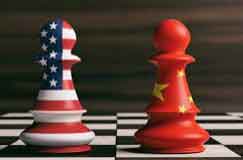A week ago, the US Commerce Department added 11 Chinese more companies to a growing list of Chinese firms that the Department are involved in in what it called human rights violations in connection with the treatment of Muslim Uygurs in Xinjian.
The department said the companies were involved in using forced labor by Uygurs and other Muslim minority groups. The companies cited include numerous textile makers and two companies the government alleges were conducting genetic analyses used to further the repression of Uygurs and other Muslim minorities.
Supply Chain Digest Says... |
 |
| Nike said it was "conducting ongoing diligence with our suppliers in China to identify and assess potential risks related to employment of Uighur or other ethnic minorities".' |
 |
What do you say? |
| Click here to send us your comments |
 |
| Click here to see reader feedback |
|
|
Blacklisted firms cannot buy components from US companies without a special license from the US government.
The Wall Street Journal reported that the actions are "entangling major brands and likely to further a reordering of supply chains that feed American consumers."
A number of major global brand companies have used some of the targeted Chinese businesses as suppliers, including Apple and apparel brands Ralph Lauren, Hugo Boss, and Tommy Hilfiger, according to a report earlier this year by the Australian Strategic Policy Institute.
It was the third group of companies in China that have been added to the US entity list, after two previous lists that combined cited 37 companies and others that it said were involved in China's repression in the Xinjiang province.
"Beijing actively promotes the reprehensible practice of forced labor and abusive DNA collection and analysis schemes to repress its citizens," Commerce Secretary Wilbur Ross said in a statement coinciding with latest blacklist.
In May the Chinese Foreign Ministry criticized US entity list additions, arguing the United States "overstretched the concept of national security, abused export control measures, violated the basic norms governing international relations, and interfered in China's internal affairs".
The blacklistings are the latest example of growing risks to US companies with extensive and frequently non-transparent supply chains in China. Beyond additional compliance burdens on American exporters and importers, analysts say reputational risks are likely to dissuade US companies from doing business with firms tied to Xinjiang.
"That, in turn, may accelerate the decoupling of supply chain links between the two countries, the Journal report adds.
(See More Below)
|
CATEGORY SPONSOR: SOFTEON |
|
|
| |
|
|
The CEO of the parent company of one of the listed companies, Changji Esquel Textile, pushed back hard against the allegations.
In a letter to Ross last week, Esquel CEO John Chen demanded its textile unit be removed from the list. "Esquel does not use forced labor, and we never will use forced labor. We absolutely and categorically oppose forced labor," Chen wrote.
Esquel is the world's largest contract maker of shirts for retailers and brand companies.
 In early July, the Commerce Department released a business advisory warning of growing evidence of forced-labor practices tied to abuses in Xinjiang, including subsidies to build factories in Xinjiang that use workers from internment camps, involuntary transfer of Uighurs to factories across China and forced labor in prisons. In early July, the Commerce Department released a business advisory warning of growing evidence of forced-labor practices tied to abuses in Xinjiang, including subsidies to build factories in Xinjiang that use workers from internment camps, involuntary transfer of Uighurs to factories across China and forced labor in prisons.
A spokeswoman for PVH Corp., which owns the Calvin Klein and Tommy Hilfiger brands, told the Journal that the company has a zero-tolerance policy for forced labor in its supply chain. "PVH will cease all business relationships with any factories and mills that produce garments or fabric, or use cotton grown, in Xinjiang within the next 12 months," the company said in a statement.
Nike said it was "conducting ongoing diligence with our suppliers in China to identify and assess potential risks related to employment of Uighur or other ethnic minorities".'
Apple also said it had investigated the claims. "We have found no evidence of any forced labor on Apple production lines and we plan to continue monitoring," the firm said.
"Brands and retailers should have left long ago, but they haven't and that is why this public call to action is important and necessary," said Chloe Cranston of Anti-Slavery International, one of the more than 180 organizations involved in the pressure campaign.
"It's not just about ending a relationship with one supplier. It's really about taking a comprehensive approach," Cranston added.
The Commerce Department has warned US companies that if there supply chains are connected to human rights abuses in China, they face not only risks to their brand reputations - but even legal peril.
"What we have is a supply chain that reaches in and out of China and into the West," Assistant Secretary of State Robert Destro told reporters earlier in the month. "If we find out that you are knowingly importing goods into the United States using forced labor, there will be prosecutions."
The Australian Strategic Policy Institute says some 80 companies are linked to factories in Xinjiang where abuses may be occurring.
What do you think of this latest Chinese risk? Let us know your thoughts at the Feedback section below.
Your Comments/Feedback
|